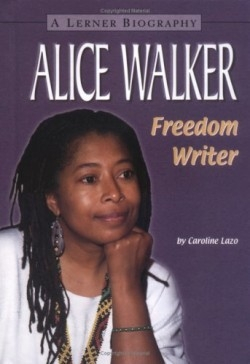
Alice Walker
Freedom Writer
Teens looking for a role model to lead them through adversity to success should consider Alice Walker. Walker, the first African-American woman to win the Pulitizer Prize for fiction for The Color Purple has triumphed over life’s struggles. Writer Gloria Steinem said the color purple “has come to symbolize the miracle of possibilities.’’
Walker’s life has been colored by purple. The granddaughter of a slave, Alice was born in 1944 to Georgia sharecroppers in the racially segregated South. The youngest of eight children, she learned creativity and a love of beauty and flowers from her hard-working mother. Her mother insisted that her children be educated rather than work in the fields. Although sometimes abusive, her father taught her important lessons.
When Walker was eight one of her brothers accidentally shot her with a BB gun, leaving her blind in one eye and with a “glob” of ugly scar tissue. Depressed, she “retreated into solitude’’ and began to write poems. When she was fourteen, her older brother arranged for surgery to remove the glob and she once again enjoyed life. In 1961 she was valedictorian of her class and was chosen prom queen.
Inspired by the words of Dr. Martin Luther King, who was protesting segregation, Walker, along with other college students became involved in the Civil Rights movement, the beginning of her social and political activism. She continued to write, and at age twenty-four, Harcourt Brace published her poems.
If Lazo’s biography ended with Walker’s incredible success as a teacher of black literature, a “womanist,” activist and a writer of poems, fiction and essays, it would provide inspiration enough for its intended teen audience. The book does not flinch from relating other sometimes painful moments in Walker’s life—pregnancy, abortion, suicidal thoughts, divorce or taking a political stand that led to self-examination, creativity, rebirth or even arrest. Walker explains, “My activism—cultural, political, spiritual—is rooted in my love of nature and my delight in human beings.’’
Lazo is an award-winning author of numerous biographies, focusing on men and women who have broken down barriers. This biography is disappointingly short on photographs of Walker and her family, using instead stock, period pictures. It curiously lacks a personal interview by Lazo with her subject, which might have added depth and freshness to the biography.
Reviewed by
Linda Salisbury
Disclosure: This article is not an endorsement, but a review. The publisher of this book provided free copies of the book to have their book reviewed by a professional reviewer. No fee was paid by the publisher for this review. Foreword Reviews only recommends books that we love. Foreword Magazine, Inc. is disclosing this in accordance with the Federal Trade Commission’s 16 CFR, Part 255.
